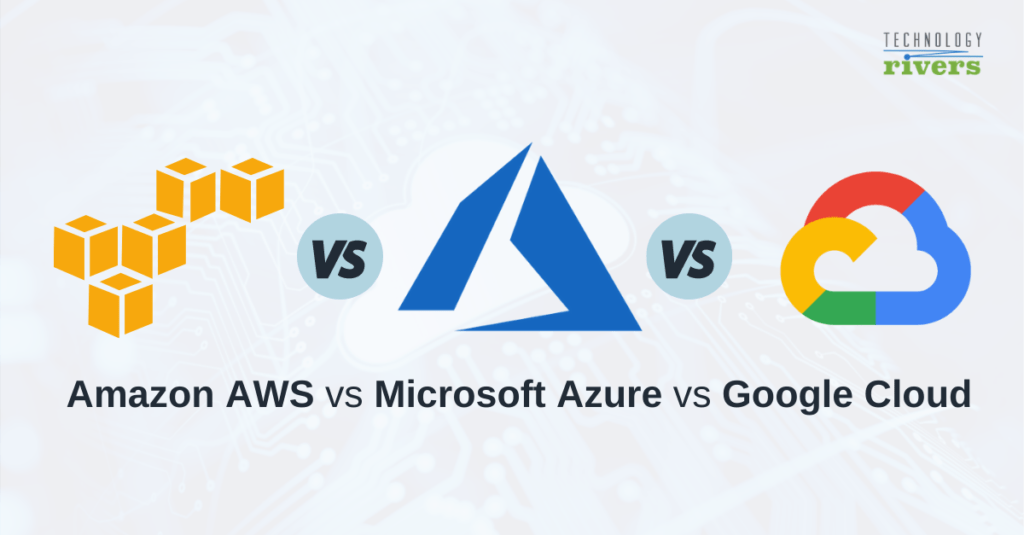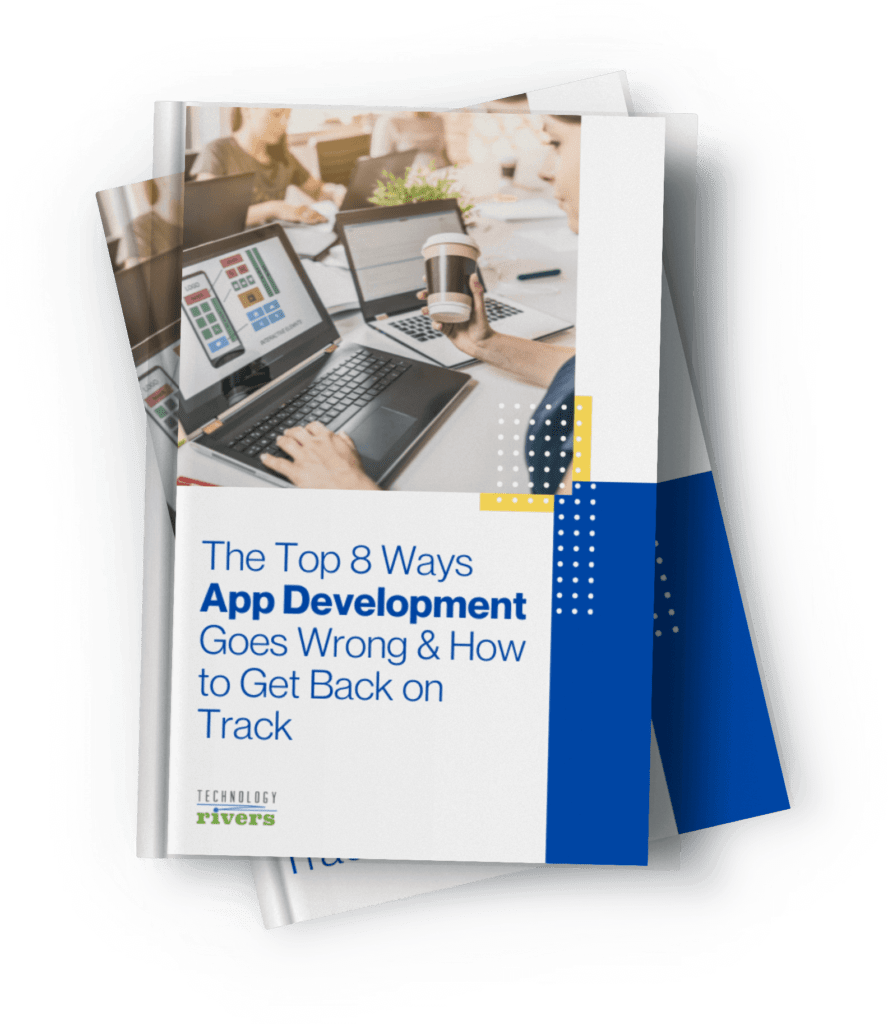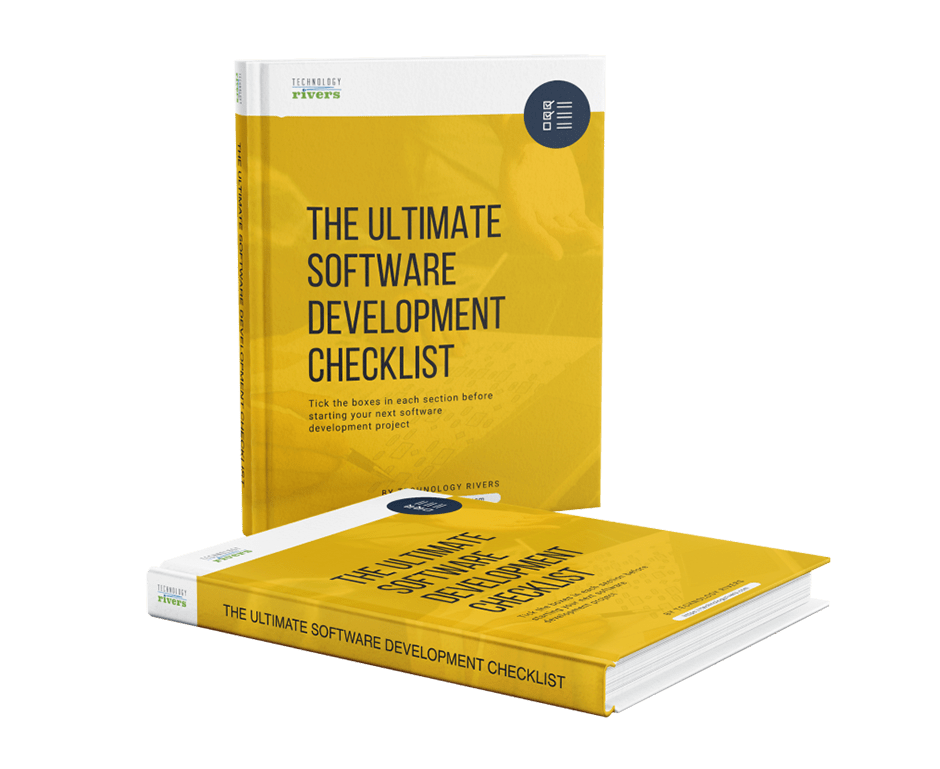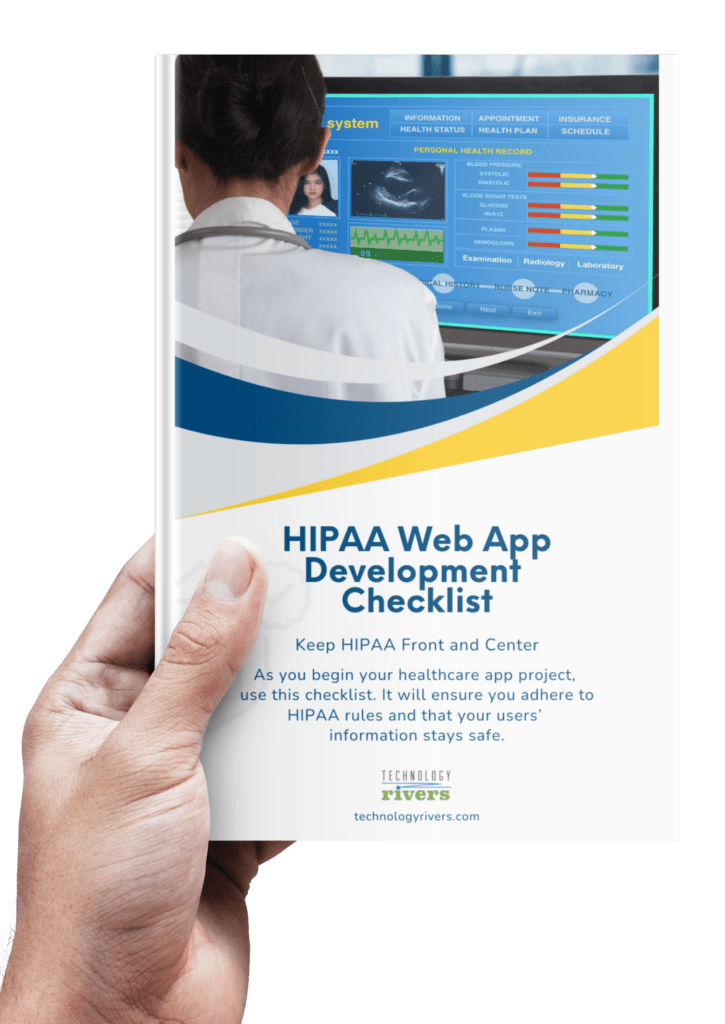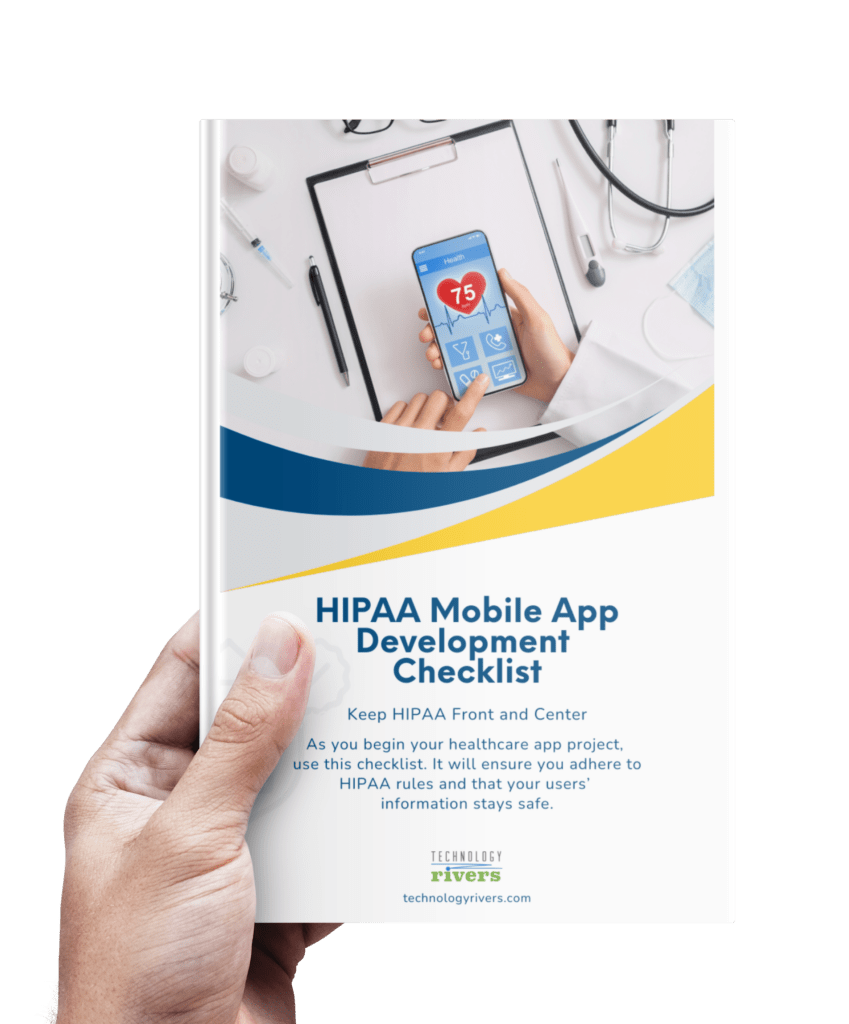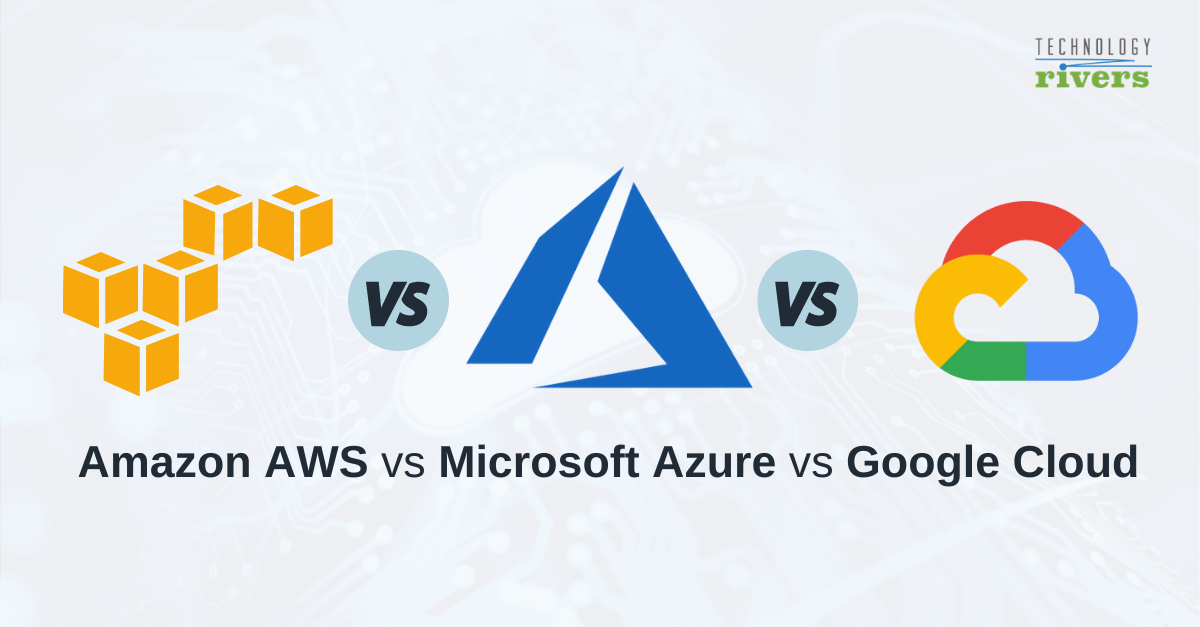
Blogs » Amazon AWS, Microsoft Azure, or Google Cloud – What Cloud Platform Should I Consider for My Next SaaS App?
Table of Contents
As most businesses are moving to Cloud, Software as a Service (Saas) solutions are becoming a new norm now. SaaS applications need a highly flexible and scalable infrastructure for it to run, and since most SaaS companies are moving out from on-premise data centers and are looking into cloud migration, this shifts to the cloud battle among the leading cloud service providers.
There are many cloud options, but in this article, we will cover the three most popular in the industry. Amazon Web Services (AWS), Microsoft Azure, and Google Cloud Platform (GCP) lead as the three top providers of infrastructure as a service (IaaS) and platform as a service (PaaS). The Gartner 2020 Magic Quadrant for Cloud Infrastructure & Platform Services lists the three as the only ones in the “Leaders Quadrant” with the most complete vision and highest ability to execute. The answer to, ‘what platform I should consider for my next SaaS app?’ is, unfortunately, not a quick and easy one, but the good news is that all three are sound options. So, let’s dig deeper into some pros and cons.
Core Cloud Features for Every SaaS Application
Here are a few core cloud features that every SaaS application needs, and will be a core consideration when considering the cloud provider.
- Scalability
- Easy/fast way to code, deploy and launch
- Security
- Cost
- Services and Features
- Extensibility (ability to extend on top of what is built initially)
- Support
- Compliance (HIPAA, FedRamp, etc)
Choosing from the Top Cloud Service Providers
Selecting a cloud vendor or provider for your SaaS will depend mostly on the workloads and the needs of the users. Some enterprises will rely on multiple providers to support every area of their operations.
Developers are always in need of more convenient ways to run their databases, perform the migration, and backup efficiently. There are differentiating factors one should consider when choosing from the top cloud providers to determine which one is right for the SaaS business.
Which Supports More And Faster Databases?
Cloud databases have various advantages in terms of scalability, security, and value for money.
These top giants have similarities in database features, but the cloud functions may still vary based on the needs of a company or enterprise. When it comes to cloud comparison, let’s look at the strengths and weaknesses of these three big leaders:
AWS Database
Amazon Web Service offers the widest offering in Database as a Service (DBaaS). The three most used are Amazon RDS, Amazon Dynamodb, and Amazon DocumentDB.
AWS has relational databases that are said to be 3 to 5x faster than its two close competitors. The distinct advantage of AWS DBaaS for storage and database is its scalability. You can start small and then scale as your business grows.
Database Engines for Specific Needs – The Amazon RDS has six database engines to choose from Amazon Aurora, MySQL, Oracle Database, PostgreSQL, MariaDB, and SQL Server. The AWS Database Migration Service can be used to migrate or replicate existing databases to Amazon RDS.
Built for high performance – The Amazon RDS is fast and can handle higher loads. There are two SSD-backed storage options. The first one is built for high-performance OLTP applications and the other one is for less demanding apps.
Secure – It allows the control of network access to the database and runs the database through Amazon Virtual Private Cloud (Amazon VPC). Many AWS RDS engine types offer encryption at rest and encryption in transit.
However, AWS DBaaS is not for beginners. It requires the expertise and skills of data scientists and database administrators or developers who are already familiar with AWS services. There are so many technicalities involved, making it less attractive for beginners.
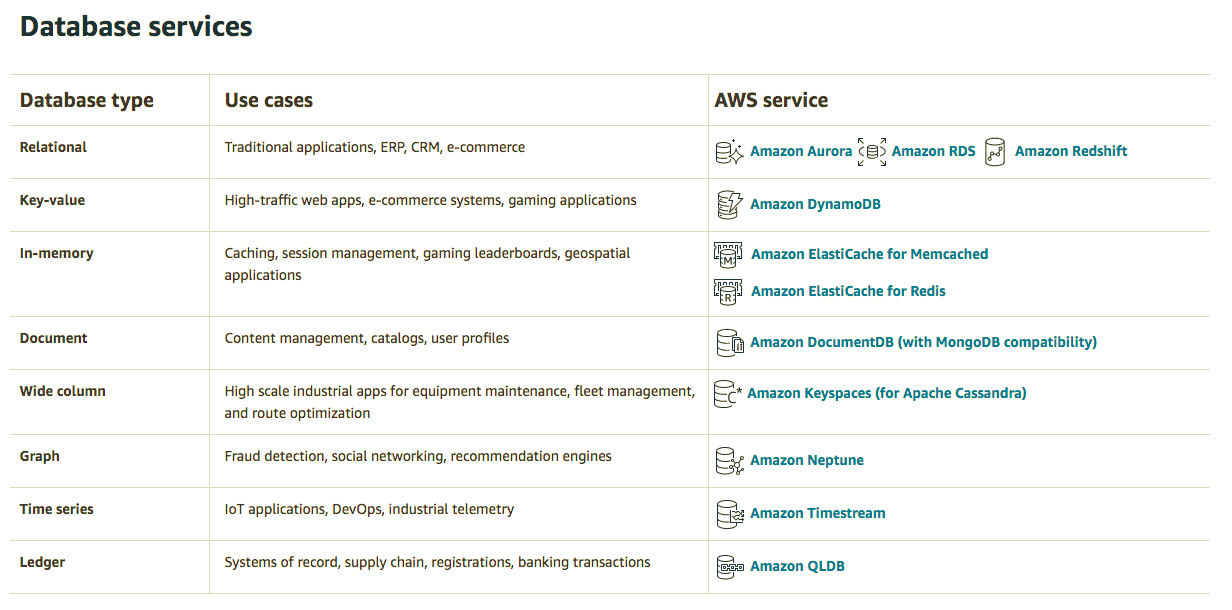
Reference: Amazon
Google Cloud Database
Google Cloud has been adopted by businesses of different sizes and it offers DBaaS options:
The Cloud SQL is also a DBAaS that can be used for MySQL, PostgreSQL, and SQL Server-based applications. This can be integrated with other Google Cloud services such as Kubernetes and Big Quer.
This can be used for application development and deployment and scalable database for containerized workloads
The Cloud Spanner is good for enterprises especially on eCommerce applications and financial trading. Basically, it enables a relational database structure with the horizontal scaling of non-relational databases.
The Cloud Bigtable is a NoDQL database that can be integrated with BigQuery and Apache. This can be used for financial analysis and IoT applications.
Google Cloud is said to be more user-friendly especially if you’re operating with Kubernetes.
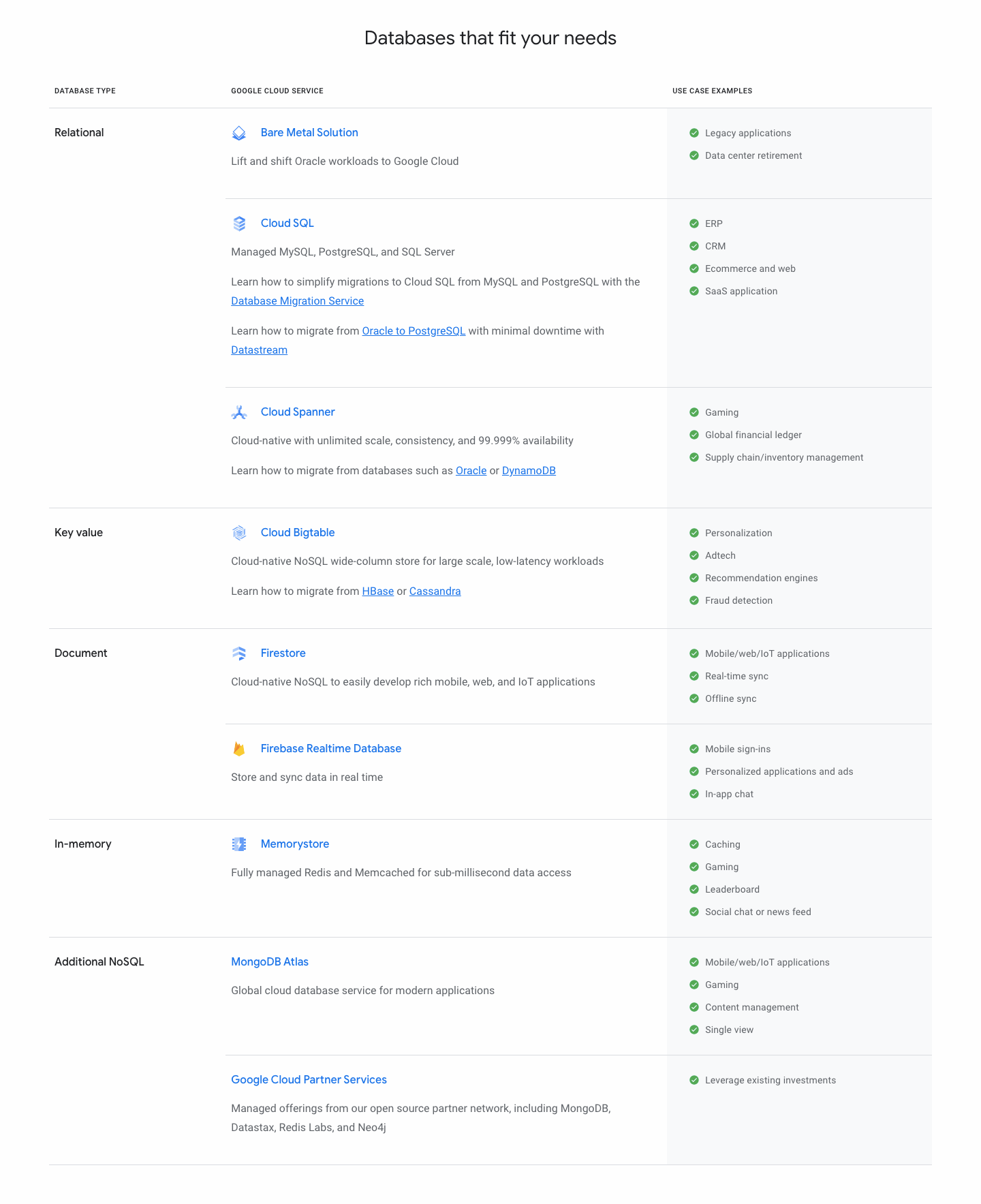 Reference: Google Cloud
Reference: Google Cloud
Microsoft Azure Database
Azure offers relational, NoSQL, and in-memory databases. There are various databases to choose from that fit the needs of the company or enterprise.
The Azure SQL Database has lots of high-end features: serverless computing, hyperscale storage, machine learning, etc. Microsoft Azure has managed databases that can be scaled since they are geared toward helping businesses focus more on building applications.
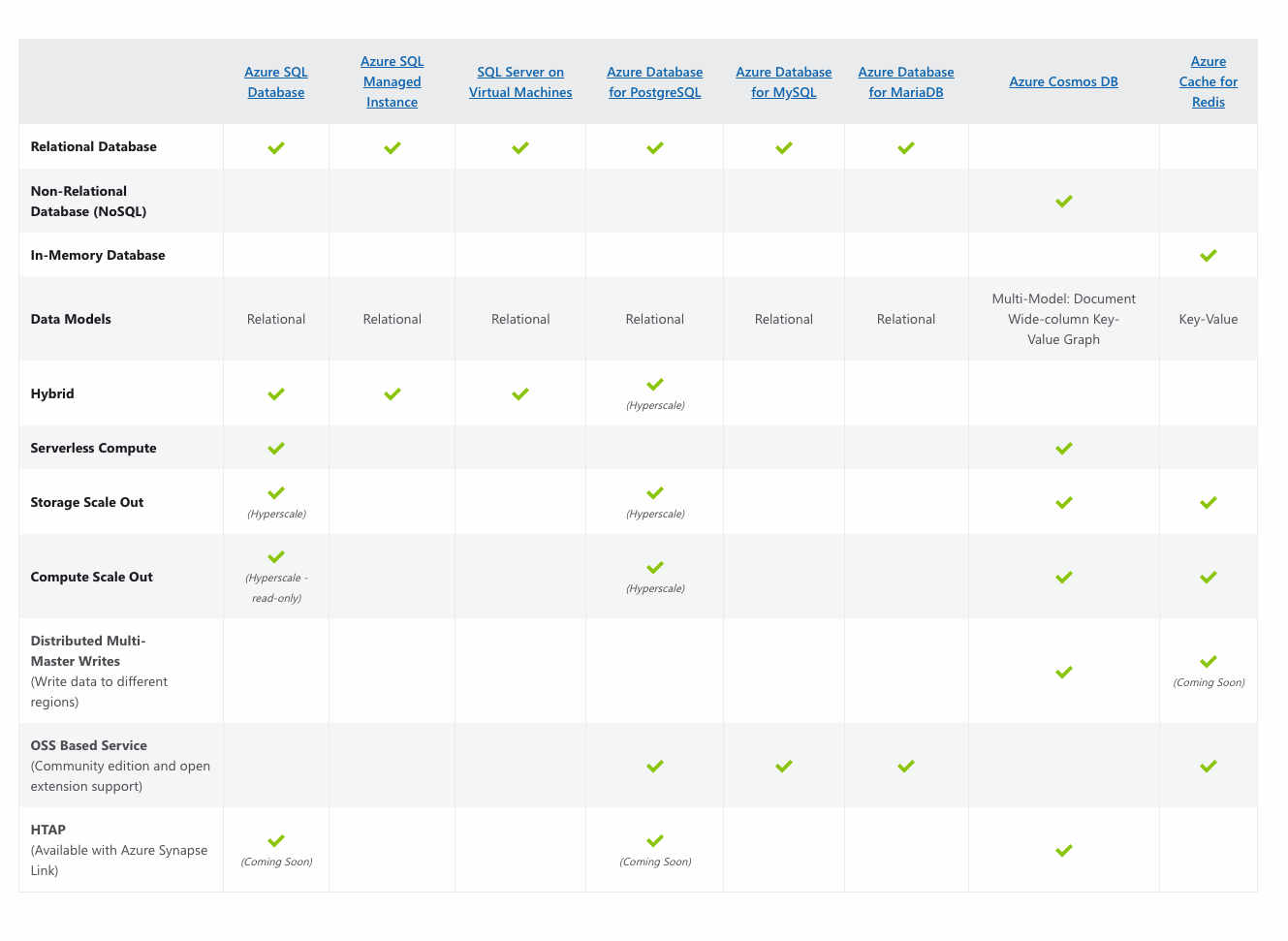 Reference: Microsoft Azure
Reference: Microsoft Azure
The Winner?
Now, to answer the question of which cloud offers more and faster databases, AWS Cloud wins this area with its vast and flexible offerings. However, AWS is not for everyone since its infrastructure is complicated and will require someone with experience in AWS.
Which Has Better Scalability Features?
Scalability is an important factor in choosing a cloud vendor for SaaS applications. One should never ignore the future challenges and the need to upgrade or scale.
Scalability in cloud computing means the infrastructure’s ability to handle the growing or diminishing needs of the business. In the traditional server and hosting, there are inconveniences such as having to pay for maintenance, adding additional server space, and interruption in the business operations. All those contribute to unplanned downtime, which is costly for the business.
An instance is created every time an application is deployed. Creating an instance means assigning a server to that app. Scaling happens when you assign more instances, which is termed scaling out. Scaling higher or bigger instances is called scaling up.
Amazon Web Service Scalability
AWS Auto Scaling, as the name suggests, will auto-scale applications and will adjust the capacity for manageable performance. This will also help with securing the lowest possible cost.
This also allows scale applications that are using Amazon EC2 or Elastic Compute Cloud instances, Amazon ECS tasks, Amazon Aurora replicas, etc.
Microsoft Azure Scalability
Azure Autoscale helps scale applications to the performance they need to meet the users’ demands. In this aspect, the distinct feature of Azure over AWS and GCP is its virtual machines.
The Virtual Machine is compatible mostly with widely used apps such as SQL Server, Oracle, IBM, Windows Server, SAP, and more.
Google Cloud Scalability
Google’s involvement in the development of Kubernetes led the company to use most of the latter’s container features. Computer Engine has machine types that are customizable with per-second billing and is important for adjusting the performance to cater to high workloads.
The Winner?
The three providers all offer scalability features in the form of auto-scaling. This auto-scale feature prevents apps or site downtime in the event of a traffic spike. Auto Scaling allows the machine to handle the high load and they can be pre-defined or customized based on the time and day when traffic skyrockets.
Which is Secure?
The Oracle and KPMG Cloud Threat Report 2020 shows that trust has continued to grow in both public cloud infrastructure and business-critical applications as a service. Cloud service providers’ security is extremely reliable. Traditional security issues under their responsibility were excluded from The Cloud Security Alliance’s laudable titled paper, “Top Threats to Cloud Computing: Egregious 11.”
These three cloud giants are providing cloud security that will help secure data, accounts, and workloads.
AWS has various security services that cater to the type of protection or security needed. They can be used to protect infrastructure, data, etc.
GCP offers secured cloud infrastructure. The encryption can be by default, at rest, and in transit.
Azure has built-in security services depending on your needs such as Microsoft Azure Attestation, Application Gateway, Azure DDoS Protection, etc.
Which Has the Best Features?
According to ZDNet, “Artificial intelligence, analytics, IoT, and edge computing will be differentiators among the top cloud service providers — as will serverless and managed services.”
“‘AWS alone has added about 1,800 features this year [2019], compared to about 28 features the first year it launched,’ notes John Yeoh, global vice president of research for the Cloud Security Alliance.
Amazon AWS’s Sagemaker has been around to help with machine learning. This machine learning can be harnessed in different ways: image recognition (AWS Rekognition), text to speech (Polly), and the Alexa counterpart called Lex.
Microsoft Azure also bolsters its machine learning to help developers with algorithms and access off-the-shelf APIs.
Google Cloud has an AI platform shop to help machine learning engineers take advantage of its open-source TensorFlow deep learning library.
Which Offers the Best Support?
AWS has good reviews on TrustRadius. It offers quick and responsive customer support.
Regarding the Azure customer experience, Gartner states, “Customers cite issues with technical support, documentation, training, and breadth of the ISV partner ecosystem.”
As written in ZDNet, “Google Cloud hasn’t fully developed its processes to deal with enterprise accounts. Contracts, discounts, licensing, and integration can be headaches for customers and the sales coverage is thin.”
Which is Cheaper for Startups?
The startup sector is bustling with opportunities given the high demand for tools in the world of big data, DevOps, cloud, mobility, and etc. and it’s only natural to choose the most cost-efficient approach in building a SaaS company. Cloud comparison using pricing has always been difficult and tricky since these cloud vendors are changing their prices. However, these three are offering free services, usually in a form of credits, to help startups explore the cloud features and functionalities and see which one is right for the business.
AWS Pricing Model
The scalability is much evident in its cost management or pricing options: Pay As You Go, Save When You Reserve, and Pay Less by Using More. AWS allows businesses not to overcommit that may eventually hurt their budget. There are volume-based discounts, or price tiers, to help businesses get more savings should they need more capacity.
AWS Free Tier allows users to explore more than 85 products as well as build on AWS. There are three different types of free offers: Always Free, 12 Months Free, and Trials. AWS supports startups with the “Founders Program,” in which qualified startups can receive AWS Activate credits.
Microsoft Azure Pricing
Microsoft Office 365 provides cost savings potential by enabling you to mix and match licensing, so you’re not bound to one type of license for all your users. Additionally, a Microsoft Azure free account provides 12 months of popular free services, $200 credit to explore Azure for 30 days, and over 25 “always free” services.
Google Cloud Platform Pricing
Google Cloud offers new customers $300 free credit to fully explore and conduct an assessment of the Google Cloud Platform.
The Winner?
We all know that some startups are ‘experimental’ businesses and they will rely on cost-effective ways to push the business forward.
Amazon Web Service is the most attractive and offers free solutions for startups. However, AWS and Azure almost have the same monthly price.
Meanwhile, Google Cloud has the highest monthly price per month although it has the lowest unit price for every GBs consumed per second.
However, this cost could be different if you combine it with offers that are offered by different incubators. Technology Rivers offers cloud credits to its customers.
Conclusion: What’s the Best Cloud for SaaS Businesses
Rather than one emerging as the clear victor, selecting a provider is more about ‘horses for courses.’ Each has advantages in different situations. Luckily, unlike riding a horse, you don’t have to choose just one.
Multi-cloud is the norm and leveraging multiple cloud providers and resources is the best path for many organizations. According to Flexera’s annual state of the cloud report for 2020, of those organizations using cloud services, 93% have a multi-cloud strategy that combines multiple public and private clouds. 62% of organizations using public cloud are using more than one public cloud.
After all, the preferred cloud vendor will still depend on the budget and business requirements. Azure will be best for companies that heavily rely on Microsoft products. AWS offers the widest selection of cloud services, and it has a global reach. GCP has flexible pricing models and is great for companies that use web-based applications.
However, if we were to choose only one cloud provider for cloud development projects, then we would personally recommend the Amazon Web Service for SaaS.
When it comes to cloud services, AWS is the proverbial 800-pound gorilla. Few might even remember that Amazon.com was once an online bookstore. In developing AWS, the company is credited with also developing the entire concept of cloud computing as an industry. AWS has a 33% market share, whereas Azure owns about 16% and Google 8%.
AWS was an early pioneer in the cloud computing space and continues to lead innovation. In particular, serverless functions are another area where AWS recently blazed trails with AWS Lambda.
Microsoft Azure has been the second top cloud service provider. Many enterprises already deploy Windows and other Microsoft software, which significantly contributes to Azure’s success. It is best for Microsoft stack dev (.net, MS SQL server). It works for others too, but this is where AWS excels.
Google Cloud Platform is still catching up with its two competitors, but Google Cloud Platform is often cited as a world leader in the field of artificial intelligence. Google Cloud offers the AI Platform, a fully managed, end-to-end platform for data science and machine learning.
Are you a startup founder looking for an expert partner to help you determine the best cloud option for your SaaS project? Reach out to us, and we can brainstorm.
Did this article help you identify which Cloud provider you want for your SaaS business? Let us know your thoughts! You may comment on our social media and start a conversation. Engage with us on LinkedIn and Facebook.


